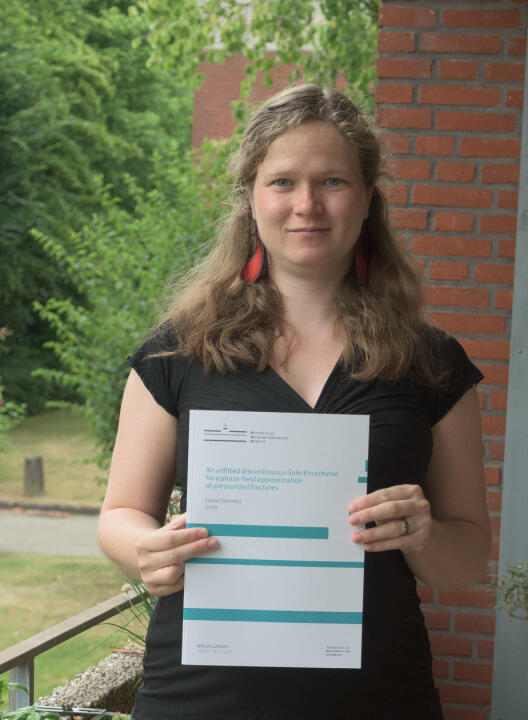Postdoc to PhD: Dr. Liesel Sommer

Dr. Liesel Sommer is currently a member in the working group applications of PDEs at the WWU.
In this interview she would like to share her experiences so far as a postdoc and during her doctorate with you. The interview took place on July 28th, 2020.
Why did you choose Münster for your Postdoc? Which universities have you been to before?
I have studied at the Humboldt-Universität zu Berlin and the Université 1 de Bordeaux. Mainly for personal reasons I decided to move to Münster for my PhD. As my contract is still running after finishing my PhD last year, I am still here as a Postdoc for a couple of months.
What are you working on? / What is your research topic?
In my work I simulate propagation of fractures. Here the usual grid based FEM methods run into problems as fractures do not only propagate along element boundaries. I combine two different approaches to tackle this problem. The introduction of a phase field smears the crack out, making exact resolving by the grid unnecessary. On the other hand, unfitted methods, like the unfitted discontinuous Galerkin method I apply, can handle discontinuities of solutions inside of elements, thus allowing a fracture to propagate trough elements.
How did you find your research topic?
The supervisor of my PhD had a couple of ideas in mind when I started working. Together we decided for one direction. Then, during my work, I focused on the things that I found most interesting.
How was the transition from you doctorate to your Postdoc and what would have been nice to know beforehand?
There was no real transition for me as I left for parental leave the day I handed in my thesis. Defending my thesis in between, I now came back roughly a year later starting directly with my Postdoc.
What does a normal working day look like? What is the difference to your PhD time?
A normal working day does not differ that much from PhD life.
Depending on my current focus I either tackle analytical problems on the paper, studying relevant literature, or I program the simulations, search for errors in source code and run convergence tests to validate my algorithms and programs.
Nevertheless, there are some differences. First, as I do not want to stay in academics, I feel a lot less pressure now and it is easier for me to get my mind off the job after work. Second, obviously I spend much less time writing things down and proof reading than in the last months of my PhD.
I would say the Postdoc for me is more like the second phase of a PhD. You are well into your subject and do the actual work, going to conferences and maybe writing first papers, but not yet writing it all down. The third big difference is sitting at home in my Home Office, discussing much less with colleagues due to Corona. But I guess that is the same for all of us.
What do you plan after your Postdoc?
I plan to leave academic life and try to find a position as software developer. I think my PhD in Applications of PDEs prepared me well for that.
Some Advices to other MMGS Members:
What would you like to have done differently during your PhD?
Be more self-confident. After all, it is your PhD thesis and not your professors and thus in the end you decide, what is going to be in there. It took me some time to realize that, although my professor encouraged me on that way. And on the other hand, ask more for help. When I started, I was very reluctant when asking others for help or ideas, as I felt my PhD thesis should really be only my work. Nevertheless, it is a standard part of research to discuss your work with colleagues and take advice or get ideas from them. Plus explaining your problem(s) to others often helps to get new ideas yourself. And in the end, that is part of your supervisors’ job, helping you, when you are stuck.
How was the final phase of your PhD? How much time should you take for things like proofreading and printing?
I never met someone who overestimated the time needed for the final phase, meaning you can never plan to much time for that. I think the most time-consuming part is writing down everything. Depending on how much you already wrote down beforehand this can easily take a year time. Proofreading depends a bit on your helpers, it is always useful to hand parts of your thesis out beforehand instead of everything at once in the end. But I guess you should plan at least 2 weeks for proofreading it yourself, then another two week minimum for others to proofread and a week for making the corrections. And this is if everything is going very smooth and your helpers are willing to proofread fast. As professors usually have a full schedule, it might take months before your supervisor has proofread your thesis, so hand out single chapters early and communicate deadlines.
Printing can be done in 24 hours I guess, but if you have the time and want more quality, you should rather plan a week or two. Best is to contact the print shop of your choice beforehand and ask.
How long should a PhD thesis be?
Well that is something you should decide yourself, after consulting with your professor. I prefer 100-150 pages, but there exist brilliant theses with about 50 or 300 pages.

